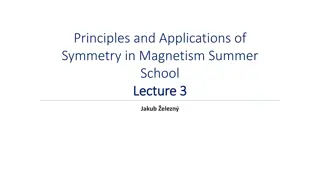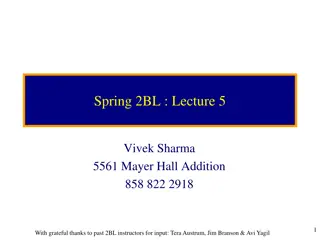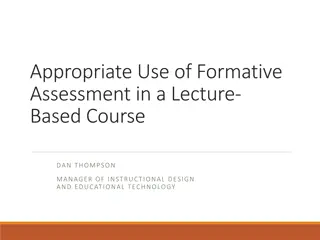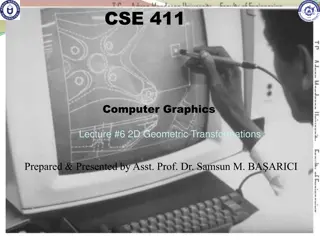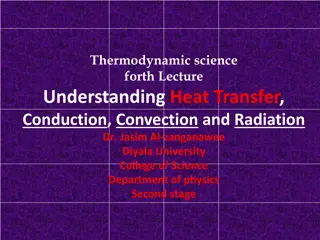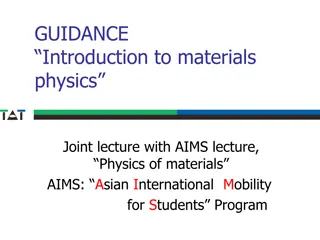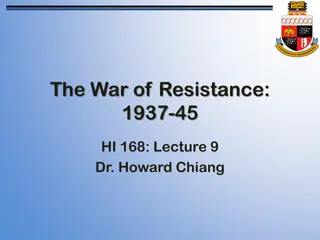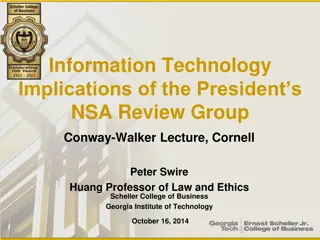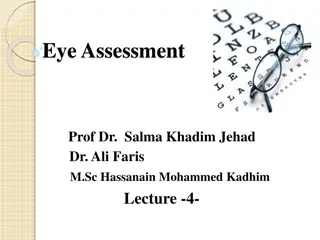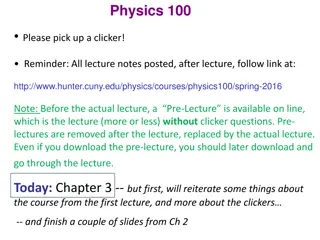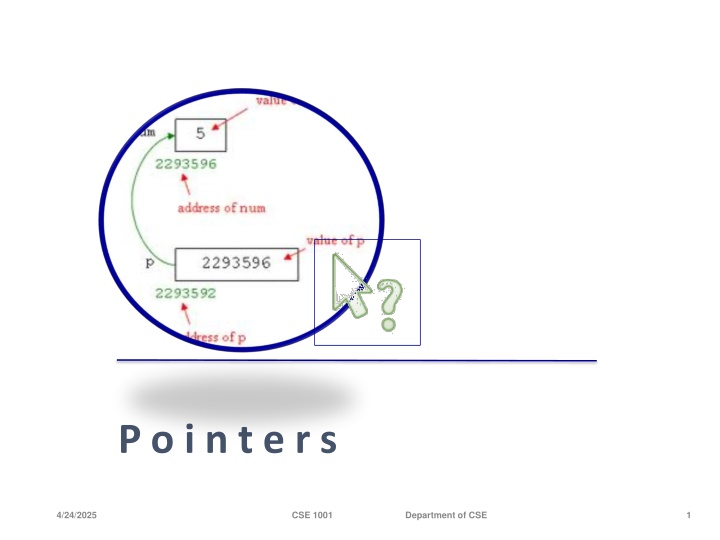
Understanding Pointers in C Programming
Delve into the world of pointers in C programming, from declaration to initialization, accessing variables, and the fundamental concepts behind pointers. Gain insight into how pointers work and their significance in programming.
Uploaded on | 0 Views
Download Presentation

Please find below an Image/Link to download the presentation.
The content on the website is provided AS IS for your information and personal use only. It may not be sold, licensed, or shared on other websites without obtaining consent from the author. If you encounter any issues during the download, it is possible that the publisher has removed the file from their server.
You are allowed to download the files provided on this website for personal or commercial use, subject to the condition that they are used lawfully. All files are the property of their respective owners.
The content on the website is provided AS IS for your information and personal use only. It may not be sold, licensed, or shared on other websites without obtaining consent from the author.
E N D
Presentation Transcript
P o i n t e r s 4/24/2025 CSE 1001 Department of CSE 1
Objectives To learn and appreciate the following concepts: Pointers declaration and initialization To access a variable through its pointer 4/24/2025 CSE 1001 Department of CSE 2
Session outcome At the end of session one will be able to: Understand the overall ideology of pointers 4/24/2025 CSE 1001 Department of CSE 3
Pointers - Concept Consider the following statement int Quantity =50; - Compiler will allocate a memory location for Quantity and places the value in that location. Suppose the address of that location is 5000, then 4/24/2025 CSE 1001 Department of CSE 4
Pointers - Concept During Execution of the program, the system always associates the name quantity with the address 5000. We may have access to the value 50 by using either the name of the variable quantity or the address 5000. Since memory addresses are simply numbers, they can be assigned to some variables which can be stored in memory, like any other variable. 4/24/2025 CSE 1001 Department of CSE 5
Pointer -A memory location or a variable which stores the address of another variable in memory -Commonly used in C than in many other languages (such as BASIC, Pascal, and certainly Java, which has no pointers). 4/24/2025 CSE 1001 Department of CSE 6
Declaring and initializing pointers Syntax: data_type * pt_name; This tells the compiler 3 things about the pt_name: The asterisk(*) tells the variable pt_name is a pointer variable. pt_name needs a memory location. pt_name points to a variable of type data_ type 4/24/2025 CSE 1001 Department of CSE 7
Accessing the address of a variable int Quantity=50 ; To assign the address 5000 (the location of quantity) to a variable p, we can write: int *p = &Quantity ; Such variables that hold memory addresses are called Pointer Variables. 4/24/2025 CSE 1001 Department of CSE 8
Pointers Concept The Address-of Operator & To find the address occupied by a variable 4/24/2025 CSE 1001 Department of CSE 9
Program to illustrate the address of operator Output: #include <stdio.h> 0x29feec 0x29fee8 0x29fee4 int main() { int var1 = 11; int var2 = 22; int var3 = 33; //print the addresses of these variables printf( %x ,&var1); printf( %x ,&var2); printf( %x ,&var3); return 0; } 4/24/2025 CSE 1001 Department of CSE 10
Declaring and initializing pointers Example: int *p; //declares a variable p as a pointer variable that points to an integer data type. variable. float *x; //declares x as a pointer to floating point Once a pointer variable has been declared, it can be made to point to a variable using an assignment statement : int quantity = 10; p = &quantity; // p now contains the address of quantity. This is known as pointer initialization. 4/24/2025 CSE 1001 Department of CSE 11
Summary till now int v; int* p; //defines variable v of type int //defines p as a pointer to int p = &v; //assigns address of variable v to pointer p Now v = 3; //assigns 3 to v 4/24/2025 CSE 1001 Department of CSE 12
To be taken care Before a pointer is initialized, it should not be used. We must ensure that the pointer variables always point to the corresponding type of data. Assigning an absolute address to a pointer variable is prohibited. i.e p=5000 A pointer variable can be initialized in its declaration itself. variable and then initializes p to the address of x. Example: int x, *p=&x; //declares x as an integer 4/24/2025 CSE 1001 Department of CSE 13
To be taken care The statement int *p = & x, x; not valid. i.e target variable x must be declared first. 4/24/2025 CSE 1001 Department of CSE 14
Accessing variable through a pointer A variable s value can be accessed by its pointer using unary operator *(asterisk) known as indirection operator. Consider the following statements: int quantity, *p, n; // 2 int variables & 1 integer pointer quantity =50; // assigns value 50 to quantity p=&quantity; // assigns the address of quantity to p n=*p; // contains the indirection operator * * Operator - value at address operator 4/24/2025 CSE 1001 Department of CSE 15
Example Accessing variable through a pointer #include <stdio.h> Output : Output : 11 11 22 22 int main() { int var2 = 22; int *ptr; int var1 = 11; //two integer variables //pointer to integer ptr = &var1; printf( %d ,*ptr); ptr = &var2; printf( %d ,*ptr); //pointer points to var1 //print contents of pointer (11) //pointer points to var2 //print contents of pointer (22) return 0; } 4/24/2025 CSE 1001 Department of CSE 16
Example - Accessing via pointers. #include <stdio.h> int main() { int var1, var2; int *ptr; //pointer to integers //two integer variables ptr = &var1; *ptr = 37; var2 = *ptr; printf( %d , var2); //same as var1=37 ( Dereferencing) //same as var2=var1 //verify var2 is 37 //set pointer to address of var1 return 0; } 4/24/2025 CSE 1001 Department of CSE 17
Reference and dereference operators & is the reference operator and can be read as "address of" * is the dereference operator and can be read as value at address or "value pointed by" 4/24/2025 CSE 1001 Department of CSE 18
Example- understanding pointers #include <stdio.h> int main() { int firstvalue = 5, secondvalue = 15; int * p1, * p2; p1 = &firstvalue; // p1 = address of firstvalue p2 = &secondvalue; // p2 = address of secondvalue *p1 = 10; // value pointed by p1 = 10 *p2 = *p1; // value pointed by p2 = value pointed by p1 p1 = p2; // p1 = p2 (value of pointer is copied) *p1 = 20; // value pointed by p1 = 20 printf( %dfirstvalue is\n ",firstvalue); printf( %dsecondvalue is ,secondvalue); return 0; } Output : Output : firstvalue firstvalue is is 10 secondvalue secondvalue is is 20 10 20 4/24/2025 CSE 1001 Department of CSE 19
Summary Pointer concept Reference operator & Dereference operator * 4/24/2025 CSE 1001 Department of CSE 20


